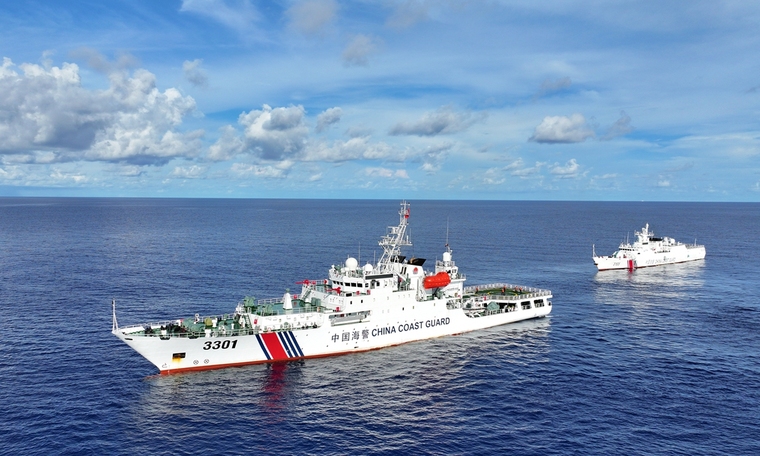Philippine media hype activities of China's largest coast guard ship; Manila 'needs to adapt to changes'

The Wanshan Vessel formation conduct towing exercises in waters off Huangyan Dao in South China Sea in July, 2024. Photo: Courtesy of China Coast Guard
The Philippine media outlet Inquirer.net reported on Monday that the China Coast Guard (CCG) Vessel 5901 was sighted 100 kilometers (54 nautical miles) from Capones Island through Canada's Dark Vessel Detection system, Commodore Jay Tarriela, Philippine Coast Guard (PCG) spokesperson, said in a statement he sent to reporters on Saturday night.
Tarriela also said that the PCG vessel and aircraft continuously challenged the presence of the Chinese coast guard, and claimed that it was operating within the Philippines' exclusive economic zone (EEZ), according to Inquirer.net.
The deployment of CCG ship 5901 has attracted significant attention from Philippine media. Outlets such as GMA News have even referred to the 5901 as a "monster ship." According to GMA's report, compared to the 2,265-ton displacement of the BRP Teresa Magbanua and Melchora Aquino, the largest ships in the PCG inventory, CCG ship 5901 is at 12,000 tons and is considered to be the largest coast guard ship in the world.
GMA News also said that according to a report by Chino Gaston on 24 Oras Weekend, by using dark vessel detection technology from Canada, the PCG detected the CCG ship and deployed the BRP Cabra and a Caravan reconnaissance aircraft to intercept and monitor the Chinese ship.
The PCG claimed that the Chinese ship is "intended to intimidate Filipino fishermen," yet Tarriela said that so far the Chinese ship has not harassed Filipino fishermen in the area, according to the GMA News report.
This is not the first time the Philippines has hyped up the normal patrol and law enforcement activities of CCG ship 5901 in the South China Sea. In July 2024, during the illegal stay of PCG vessels in the waters near China's Xianbin Jiao, the Philippines also maliciously hyped up the patrol and law enforcement activities of the ship 5901 near China's Ren'ai Jiao and Xianbin Jiao.
Ding Duo, director of Research Center for International and regional studies, National Institute for South China Sea Studies, told the Global Times on Monday that it is evident that the Philippines is continuously promoting its "transparency initiative," not only constantly creating incidents for "photo ops" but also trying every means to discredit China's maritime law enforcement actions aimed at safeguarding its rights.
"After China announced the baselines of the territorial sea adjacent to Huangyan Dao, both the PLA Navy and the CCG are set to increase their routine patrols and exercises in the area, and the Philippines needs to adapt to this process," Ding said, noting that following the announcement of the baseline, China's management and control over Huangyan Dao are bound to tighten, and the Philippine side needs to get used to the increased intensity and changes in China's law enforcement actions to safeguard its rights.
Since December 2024, the CCG has continuously strengthened law enforcement patrols in the territorial waters and surrounding areas of Huangyan Dao, monitoring and driving away illegal harassing vessels, further enhancing control over the relevant maritime areas. A shipborne helicopter was for the first time deployed in the waters around Huangyan Dao to conduct maritime search and rescue training. On New Year's Day, all the law enforcement officers of the Chuanshan ship held a flag raising ceremony in the waters around Huangyan Island, according to CCTV.
Ding noted that after the baseline of territorial waters around Huangyan Dao was announced, the scope of the waters under China's jurisdiction near Huangyan Dao has become clear. This area is definitely not within the exclusive economic zone of the Philippines, as they claimed, Ding said.
The law enforcement activities conducted by the CCG in the waters near Huangyan Dao are entirely justified. The routine monitoring and alert operation carried out by the CCG in this area are by no means the threats, coercion or intimidation of Filipino fishermen as claimed by the Philippine side, Ding noted. "If the Philippine side does not intend to infringe or provoke, there is no need to have a guilty conscience," the expert said.
(Source: Global Times)














